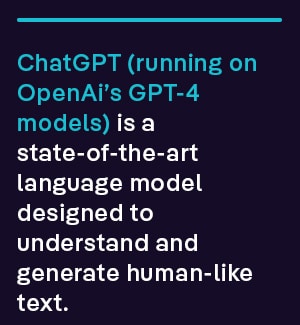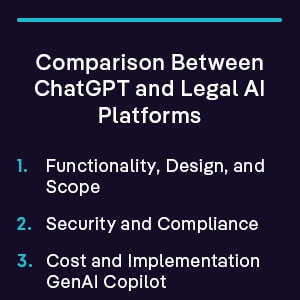In the age of artificial intelligence (AI), the legal industry has seen a significant transformation. From document automation to case prediction, AI is making its way into various legal applications.
The rise in popularity of Generative AI, exemplified by OpenAI’s ChatGPT, underscores its user-friendly nature. However, this article endeavors to illuminate the concept of AI for Legal, emphasizing that while ChatGPT has its merits, it falls short of meeting the comprehensive demands of the legal domain.
Understanding ChatGPT
 What is ChatGPT?
What is ChatGPT?
ChatGPT (running on OpenAi’s GPT-4 models) is a state-of-the-art language model designed to understand and generate human-like text. It’s widely used in chatbots, content creation, and other applications. While it’s versatile, it lacks the specialized functionality required for complex legal tasks.
How ChatGPT Works
Built on a deep learning architecture, ChatGPT is trained on vast amounts of text data – however, this data is only up until 2023. Its design enables it to predict and generate text based on context. However, its general-purpose nature means it lacks a nuanced understanding of legal terminology and regulations.
This can be a massive danger if you’re expecting to receive absolute truth or expecting the results to be fully-accurate, since ChatGPT is very good at making things up (what some folks call “hallucinations”). The AI isn’t really hallucinating – what’s happening is that it is a giant predictive text engine, and this means that having domain-specific solutions becomes even more imperative.
Enterprise Conversational Legal AI Platforms
Definition and Importance
Domain-specific legal AI platforms are specifically designed for legal use cases. They integrate with legal databases, understand legal jargon, and can perform tasks like case analysis, document review, and more.
Features and Capabilities Checklist:
- How do you analyze your product and plan for AI features/capabilities?
- What models are being used to deliver the new features and capabilities?
- Can you fine-tune the pre-trained model ( i.e., ChatGPT and Bard)?
- Is the model fine-tuned for legal and can you control the way data is interpreted?
- What data do you use for training?
- Details on AI Guardrails for security and Ethics?
- Do you use customer data to train?
Adoption in Law Firms
Many legal firms have begun to implement these platforms, overcoming challenges such as integration and customization. The specialized nature of these tools makes them invaluable in the legal industry, especially as lawyers dive into the added capacity and augmented abilities that working with such tools can provide.
Comparison Between ChatGPT and Legal AI Platforms
Functionality, Design, and Scope
Although ChatGPT performed admirably in casual conversations, its efficacy diminishes within legal contexts. In contrast, dedicated legal AI platforms, meticulously calibrated for intricate legal tasks and extensively tested within legal frameworks, boast legal-specific user interfaces, rendering them notably more fitting for the legal sector.
For Clients Security and Compliance
Data protection and regulatory compliance are paramount in the legal field. Specialized legal AI platforms are designed with these considerations in mind, whereas ChatGPT lacks these specific security measures.
Cost and Implementation
Though ChatGPT may seem cost-effective, the total cost of ownership can be higher due to the need for customization and additional security measures. Specialized legal AI platforms, while possibly more expensive up front, offer a more streamlined implementation process.
Future of AI in Legal Industry
Emerging Technologies
The legal industry continues to evolve with new tools and platforms. Innovations are on the horizon, promising to further enhance legal practice.
Ethical Considerations
As AI permeates the legal field, ethical considerations such as bias, fairness, transparency, and accountability become increasingly important. These must be addressed to maintain trust and integrity in the legal system.
Conclusion
ChatGPT, while powerful in many applications, is not a replacement for Enterprise Conversational Legal AI Platforms. The specialized nature, security considerations, and tailored functionality of legal AI platforms make them indispensable in the legal industry. Legal firms and technology providers must recognize these differences to make informed decisions.
Frequently Asked Questions (FAQs)
Can ChatGPT be used for simple legal tasks?
Yes, but with limitations (and, in fact, they even note that it isn’t designed for legal work, so it’s important that a trained lawyer – knowledgeable both in the way AI works and the law, review any output). It lacks the specialized understanding required for complex legal tasks.
What are the main differences between ChatGPT and specialized legal AI platforms?
Specialized legal AI platforms offer features tailored to legal tasks, whereas ChatGPT is a general-purpose tool.
How do legal AI platforms ensure compliance with regulations?
They are designed with specific security measures and integrate with legal databases to ensure compliance.
Is it cost-effective to implement specialized legal AI platforms?
While possibly more expensive upfront, they offer a more streamlined and secure solution.
What are the ethical considerations when using AI in the legal industry?
Considerations include bias, fairness, transparency, and accountability.
By understanding the distinct differences between ChatGPT and specialized legal AI platforms, we can appreciate the unique value that each brings to the table. While conversational AI platforms have begun to revolutionize many industries, the legal field requires tools specifically designed to meet its unique challenges and complexities.
 What is ChatGPT?
What is ChatGPT?


